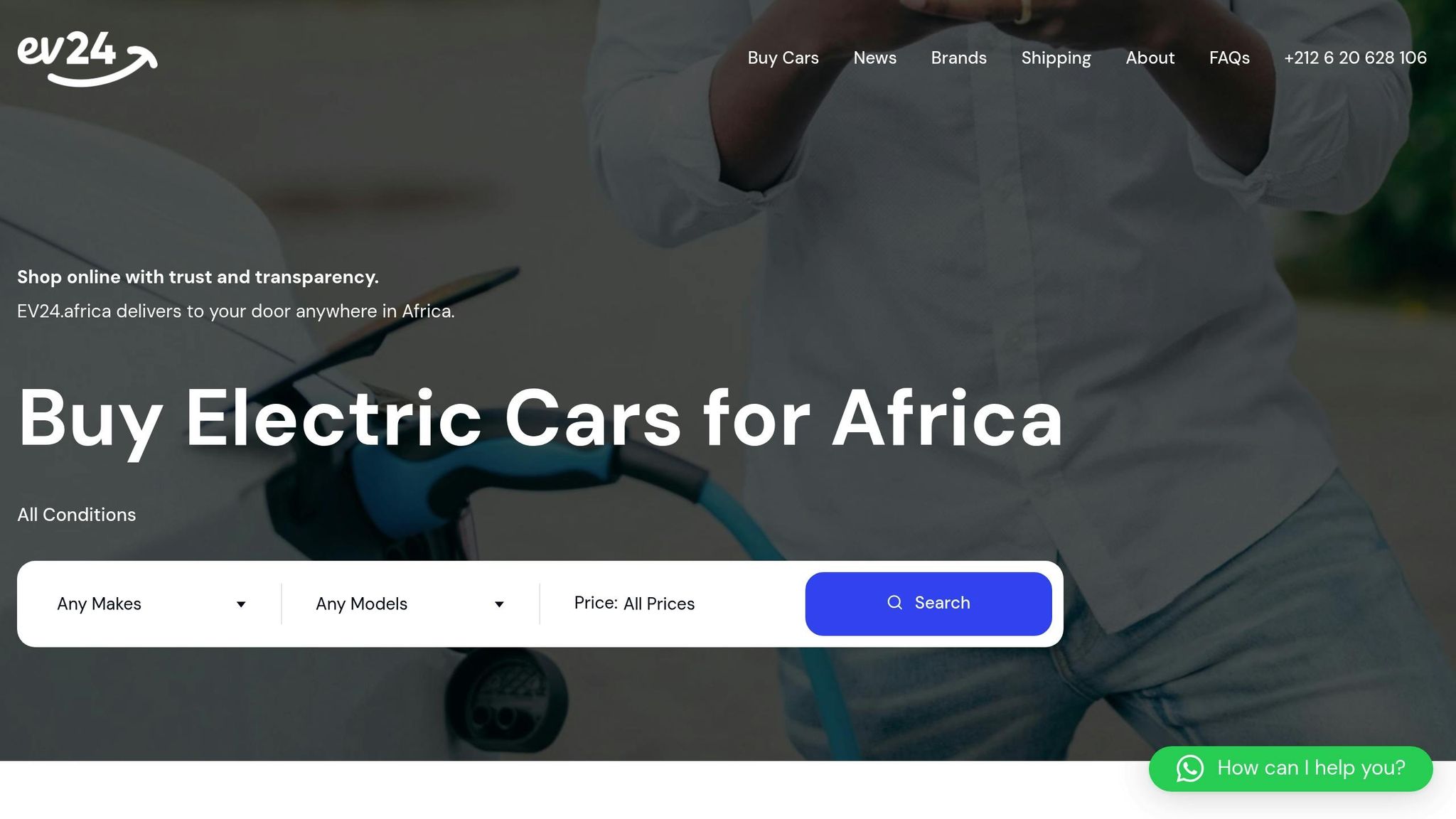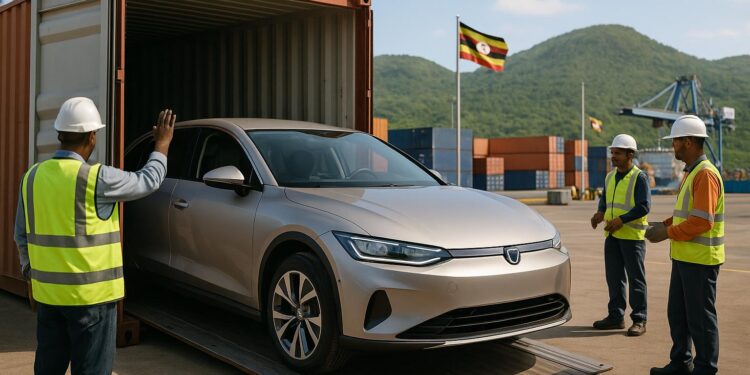Want to import an electric car to Uganda without the hassle? EV24.africa simplifies the entire process, from sourcing vehicles to delivery, making it easier for Ugandans to embrace electric mobility. Here’s what you need to know:
- EV Popularity in Uganda: Electric vehicle imports surged from 26 units to 420 in 2023–2024, thanks to tax exemptions and rising fuel costs. However, as of July 2024, a 25% import duty applies to EVs.
- Government Support: Uganda aims for full EV sales by 2040, exempting 100% electric cars from VAT and customs duties.
- EV24.africa Services: The platform manages sourcing, customs, shipping, and delivery, offering flexible options like RoRo or container shipping and door-to-door service.
- Vehicle Choices: EV24.africa provides a range of new and pre-owned brands like Tesla, BYD, and Volkswagen, with models starting at $4,800.
- Shipping Options: Choose between Delivered Duty Paid (DDP) for convenience or Free on Board (FOB) for more control.
- Cost Factors: Buyers should consider vehicle price, shipping fees, insurance, and Uganda’s 25% import duty when planning their purchase.
Quick Tip: Select EVs with high ground clearance and adequate battery range to suit Uganda’s roads and charging infrastructure.
EV24.africa ensures a smooth experience, helping Ugandans transition to electric vehicles while navigating logistics and regulations.
EV adoption stalls as import taxes return
EV24.africa Platform Services Overview

EV24.africa makes importing electric vehicles (EVs) to Uganda straightforward by offering comprehensive services that cover every step – from sourcing to delivery. Here’s how the platform simplifies the process for Ugandan buyers.
Wide Vehicle Selection
EV24.africa provides access to a broad selection of EVs sourced from Europe, Asia, North America, and Japan. This global reach ensures that Ugandan buyers can choose from the latest models and technologies that suit their preferences and budgets.
The platform features a variety of brands, including Tesla, BYD, Volkswagen, XPeng, Leapmotor, Changan, Wuling, Mercedes-Benz, Citroën, and Peugeot. Whether you’re looking for compact cars, sedans, luxury vehicles, or light commercial options like vans and small trucks, there’s something for everyone. Buyers can also decide between new or certified pre-owned models, with options like the LINGBOX UNI starting at $4,800, the GEELY PANDA MINI BASE at $5,880, and the BYD YUAN PRO at $10,880.
Expert Support for Buyers
EV24.africa doesn’t just offer a range of vehicles – it also provides expert guidance throughout the buying process. With a team of over 200 professionals across five African countries and partnerships in more than 40 nations, the platform ensures personalized support tailored to Uganda’s market.
One standout feature is the assistance with customs and regulatory compliance. The team helps navigate customs clearance, registration, and import taxes, ensuring vehicles meet Uganda’s requirements. This is particularly advantageous given Uganda’s recent exemption of 100% electric vehicles from VAT and customs duties.
Shipping support is another key service. The team helps buyers decide between Roll-on/Roll-off (RoRo) or container shipping based on their vehicle type, budget, and urgency. EV24.africa also operates under international commercial terms (Incoterms), offering options like Delivered Duty Paid (DDP) for a hands-off experience or Free on Board (FOB) for those who prefer more control.
Easy-to-Use Platform Features
Transparency is a priority for EV24.africa. Each vehicle listing includes detailed specifications and clear pricing, so buyers can make informed decisions without worrying about hidden costs.
The platform also offers real-time shipment tracking, allowing buyers to monitor their EV’s journey to Uganda. Delivery options are flexible – customers can choose port-to-port delivery, where they handle transportation from Mombasa, or opt for door-to-door service, where EV24.africa manages the entire delivery process. This flexibility accommodates various vehicle types and delivery preferences.
A built-in quote system provides a transparent cost breakdown, covering everything from purchase to delivery. These user-friendly features are designed to make the importing process as smooth as possible.
Together, these services reflect EV24.africa’s core mission:
"We simplify the process of importing and buying electric vehicles in Africa. Our expertise ensures a seamless, transparent, and stress-free experience, so you can focus on driving the future of mobility." – EV24.africa
Step-by-Step Guide to Importing an Electric Car with EV24.africa
Here’s a straightforward four-step process to help you import an electric vehicle (EV) internationally. With EV24.africa, the technical details are managed for you, and you’ll stay informed at every stage.
Step 1: Selecting the Right Electric Vehicle
Start by exploring EV24.africa’s online marketplace. Here, you can compare vehicles based on factors like pricing, battery capacity, driving range, and charging compatibility – essential details for Uganda’s developing EV infrastructure.
When choosing a model, focus on battery range to ensure it fits your needs for both city commuting and longer trips, as charging stations are still being established. The platform also highlights which vehicles qualify for Uganda’s 100% electric vehicle tax exemption, eliminating VAT and customs duties.
Additionally, check the charging specifications of each listing to confirm compatibility with Uganda’s current and expanding EV infrastructure.
Step 2: Requesting a Quote and Understanding Costs
Once you’ve picked your ideal EV, request a detailed cost breakdown. EV24.africa provides a comprehensive quote covering the vehicle price, shipping fees, insurance, and any additional charges, like the 1.5% infrastructure tax. The quote also reflects Uganda’s tax exemptions for fully electric vehicles and includes shipping options under Delivered Duty Paid (DDP) or Free on Board (FOB) terms.
Here’s a quick overview of the two shipping terms:
- Delivered Duty Paid (DDP): EV24.africa handles all expenses and paperwork, delivering your car ready to drive.
- Free on Board (FOB): You manage customs clearance and inland transport from Mombasa, giving you more control over the process.
Since most finished products are subject to a 25% import duty, Uganda’s electric vehicle exemption can lead to substantial savings.
Step 3: Placing an Order and Tracking Delivery
After reviewing your quote, finalize your order through EV24.africa’s secure payment system. The platform follows international commercial terms, ensuring clear responsibilities for all parties involved.
You can select between economical port-to-port delivery or a more convenient door-to-door service. Once your order is confirmed, EV24.africa takes care of shipping, customs clearance, and registration. You’ll also gain access to real-time tracking to monitor your vehicle’s journey – from departure to arrival in Uganda.
"EV24.africa is the leading online marketplace for electric vehicles (EVs) in Africa, allowing customers across all 54 African countries to purchase and import electric cars with trust and transparency."
Most shipments to Uganda arrive at the Port of Mombasa in Kenya, followed by inland transport. The entire process usually takes several weeks, depending on the vehicle’s origin and shipping method. During this time, EV24.africa’s tracking system and support team are available to assist you across multiple African countries.
When your EV arrives in Uganda, you’ll either pick it up at the port (if you chose port-to-port delivery) or receive it at your specified address (for door-to-door service). EV24.africa ensures all necessary paperwork is completed, so you can register and start driving your electric car right away.
sbb-itb-7bab64a
Ugandan Import Regulations and Logistics Compliance
Importing electric vehicles (EVs) into Uganda involves navigating specific legal and logistical requirements. EV24.africa simplifies this process by managing these steps, ensuring a smooth and transparent experience. Here’s a closer look at how they handle import compliance and logistics to make things easier for buyers.
Import Documentation and Customs Clearance
To clear Ugandan customs, several key documents are required. These include:
- Original CIF Invoice: This document outlines the cost, insurance, and freight value of the vehicle.
- Original Bill of Lading: Serves as proof of shipping and ownership.
- Import Declaration Form (IDF): Issued by Ugandan Customs to authorize the import.
- Original Logbook: From the vehicle’s country of origin.
EV24.africa takes the hassle out of paperwork by working closely with local customs and logistics experts. Their experienced teams ensure all documentation is properly prepared and submitted. They also provide guidance on potential tax exemptions and incentives, making the process more straightforward. By partnering with specialized forwarding agents and customs brokers, EV24.africa ensures that your paperwork is handled by professionals who understand both international shipping protocols and Uganda’s specific import regulations.
Shipping Terms and Delivery Options
Once the documentation is sorted, the next step is organizing shipping and delivery. EV24.africa uses internationally recognized Incoterms to clearly outline the responsibilities of buyers and sellers at each stage of the shipping process. These terms help clarify who is responsible for logistics, insurance, and costs during the vehicle’s journey.
The platform offers several shipping options to meet different needs:
- Delivered Duty Paid (DDP): EV24.africa handles all costs, including import duties, and delivers the vehicle directly to your destination.
- Free on Board (FOB): You take responsibility for customs clearance and inland transport from the Port of Mombasa, potentially reducing costs.
- Cost Insurance and Freight (CIF) and Delivered at Place (DAP): CIF covers shipping and insurance to the port, leaving you to manage customs clearance and final delivery. DAP delivers the vehicle to a specified location in Uganda, with you handling import duties and clearance.
Vehicles typically enter Uganda through the Port of Mombasa before being transported inland. EV24.africa provides two main shipping methods:
- RoRo (Roll-on/Roll-off): The vehicle is driven onto the ship, offering a cost-effective option.
- Container Shipping: Provides extra protection for the vehicle during transit.
Whether you choose door-to-door or port-to-port delivery, EV24.africa’s logistics network ensures your EV arrives safely and efficiently. Their clear explanations of shipping terms and responsibilities allow you to choose the option that works best for your situation, with full transparency about what each choice entails for both the buyer and EV24.africa.
Cost Considerations and Practical Tips for Ugandan Buyers
Bringing an electric vehicle into Uganda through EV24.africa requires thoughtful financial planning, especially given recent changes in import policies. Understanding all associated costs is crucial before committing to a purchase.
Breaking Down Import Costs
When importing an EV, the expenses go far beyond just the sticker price of the car. You’ll need to account for the vehicle’s price, shipping charges, insurance, import duties, and other related fees. Recent policy changes have significantly influenced these costs.
One major shift happened in July 2024, when Uganda raised the import duty on electric vehicles, hybrids, and electric motorcycles from 0% to 25%. For instance, a Nissan Leaf that previously cost $55,000 (UGX 204.3 million) now totals $68,750 (UGX 255.3 million) after the new duty is applied.
The impact of this policy is evident in import statistics. During the period when the duty was 0%, Uganda imported 420 electric vehicles – an enormous jump from just 26 units in the prior year when duties were in place. Among these 420 vehicles, 403 were hybrids, while only 17 were fully electric.
To determine your total importation cost, factor in the following:
- The vehicle price from EV24.africa
- International shipping fees
- Comprehensive insurance
- The 25% import duty
- Local transportation from the port
- Customs processing fees
Some buyers may qualify for exemptions. For example, companies involved in EV manufacturing, battery production, or charging equipment can avoid import duties if they employ at least 80% Ugandan citizens. Similarly, businesses using 80% locally sourced materials and meeting specific investment thresholds – $10 million for foreign investors, $300,000 for citizens, or $150,000 for upcountry operations – can benefit from Stamp Duty Tax exemptions if they also meet the local employment requirement.
Once you’ve accounted for the costs, the next step is choosing a vehicle that can handle Uganda’s unique road conditions.
Selecting the Best EV for Ugandan Roads
Cost is one part of the equation, but ensuring your vehicle performs well on Uganda’s roads is just as important. The right EV will balance affordability with practicality.
Uganda’s road conditions vary widely, making certain features more critical. Look for EVs with high ground clearance to navigate rough terrain and advanced thermal management systems to keep the battery efficient in hot weather. Models with liquid-cooled battery packs tend to perform better in warm climates compared to those with air-cooled systems.
Your driving habits also play a role. If you primarily drive in urban areas with limited charging infrastructure, plug-in hybrids might be a more flexible option. On the other hand, if you have consistent access to charging stations and want to minimize fuel costs, a fully electric vehicle could be a worthwhile investment, even with its higher initial price.
Range anxiety is another key consideration. Choose an EV with enough battery capacity to comfortably cover your longest regular trips. Platforms like EV24.africa provide detailed specifications, including real-world range estimates, to help you select a vehicle that fits your needs and lifestyle.
Conclusion
Bringing an electric vehicle into Uganda is now simpler than ever, thanks to EV24.africa’s all-inclusive support system. The platform takes care of everything – from sourcing the right vehicle to navigating customs clearance – while offering access to a wide range of top EV brands tailored to fit your budget and Uganda’s road conditions.
This initiative is driven by industry leaders with a shared vision for Africa’s electric future.
"Africa is ready for electric vehicles, and EV24.africa is committed to making this transition smooth and accessible. Our goal is to provide a reliable, transparent, and competitive marketplace for EV buyers across the continent." – Axel Peyriere, Co-Founder and CEO of EV24.africa
With a team of over 200 professionals spread across five African countries, EV24.africa ensures every import is handled with care and expertise. From customs clearance at the Port of Mombasa to vehicle registration in Uganda, their process is seamless and transparent. Clear pricing and flexible shipping options mean you can trust them to guide you every step of the way.
As Uganda moves toward a greener future, EV24.africa stands ready to help Ugandan buyers transition to electric mobility. By combining expert knowledge, extensive networks, and local expertise, they make importing an electric vehicle straightforward and stress-free.
FAQs
What should I look for when choosing an electric car for Uganda’s roads?
When choosing an electric vehicle (EV) for Uganda’s roads, it’s important to focus on features that can handle the country’s challenging terrains. Look for an EV with high ground clearance and a sturdy build to navigate uneven or rough surfaces with ease. Many EVs are built with city driving in mind, so selecting one that can manage a variety of road conditions is key.
Opt for models equipped with all-wheel drive to improve traction and durable battery systems that can perform well despite Uganda’s varying climate and infrastructure. These qualities will help ensure your EV stays reliable, efficient, and safe no matter where the road takes you.
How does the 25% import duty impact the cost of bringing an electric car into Uganda?
The 25% import duty on electric vehicles in Uganda has a significant impact on their pricing, pushing them out of reach for many potential buyers. Take the Nissan Leaf as an example: its cost jumped by over 51 million Ugandan shillings (about $13,750), increasing from 204.3 million UGX ($55,000) to 255.3 million UGX ($68,750) because of this tax.
This steep increase makes bringing EVs into the country a tougher financial decision for consumers, which could slow down the growth of electric vehicle use in Uganda.
How does EV24.africa help with Uganda’s customs and import rules for electric cars?
EV24.africa makes importing electric vehicles into Uganda hassle-free by handling customs clearance, registration, and import taxes for you. They take care of ensuring that every vehicle complies with Uganda’s regulations, sparing you the stress and saving you valuable time.
Their team walks you through the paperwork and compliance requirements step by step, so you can concentrate on choosing the perfect electric car without getting bogged down by the technicalities of the import process.
Related posts
- How to Import a Car to Uganda: Complete Guide 2025
- Top 5 Electric Vehicles Gaining Popularity in Uganda
- Uganda’s Localization Policies in Automotive Manufacturing
- Electric Cars in Uganda: What’s Available and Where to Buy ⚡️




